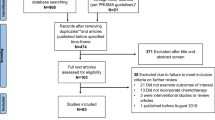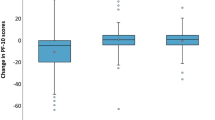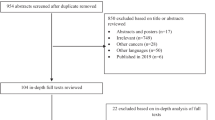Abstract
Purpose
Cancer treatment can profoundly impact the patient’s quality of life (QOL). It has been well documented that there are gender differences in the symptoms associated with cancer treatment. This study explores the impact of gender on QOL for patients with newly diagnosed advanced cancer.
Methods
A randomized, controlled clinical trial in patients receiving radiotherapy for advanced cancer demonstrated maintenance of QOL with a six session multidisciplinary structured intervention compared to controls. This current study reports the gender differences in that trial. Outcome measures included the functional assessment of cancer therapy-general (FACT-G), linear analog self-assessment (LASA), and profile of mood states (POMS) at baseline and weeks 4, 27, and 52. Kruskal–Wallis was used to compare QOL scores.
Results
One hundred thirty-one patients (45 women and 86 men, mean age 58.7) participated in the clinical trial. At week 4 postintervention, women in the intervention group had statistically significant improvement in their FACT-G score, FACT-G physical well-being subscale, LASA fatigue, POMS total score, POMS fatigue–inertia subscale, and POMS confusion–bewilderment subscale (p < 0.05). Men receiving the intervention had a smaller decrease in FACT-G score compared to controls (p = 0.048) and also worsened on the LASA financial (p = 0.02). At week 27, the only gender difference was that intervention group men had more POMS anger–hostility (p = 0.009). By week 52, there were no statistically significant gender differences in any of the QOL measures.
Conclusions
Gender-based differences appear to play a role in the early, but not late, response to a multidisciplinary intervention to improve QOL for patients with advanced cancer, suggesting that early interventions can be tailored for each gender.
Similar content being viewed by others
References
Jemal A, Siegel R, Ward E, Murray T, Xu J, Smigal C, Thun MJ (2006) Cancer statistics, 2006. CA Cancer J Clin 56(2):106–130
Rummans TA, Clark MM, Sloan JA, Frost MH, Bostwick JM, Atherton PJ, Johnson ME, Gamble G, Richardson J, Brown P, Martensen J, Miller J, Piderman K, Huschka M, Girardi J, Hanson J (2006) Impacting quality of life for patients with advanced cancer with a structured multidisciplinary intervention: a randomized controlled trial. J Clin Oncol 24(4):635–642. doi:10.1200/JCO.2006.06.209
Clark MM, Rummans TA, Atherton PJ, Cheville AL, Johnson ME, Frost MH, Miller JJ, Sloan JA, Graszer KM, Haas JG, Hanson JM, Garces YI, Piderman KM, Lapid MI, Netzel PJ, Richardson JW, Brown PD (2012) Randomized controlled trial of maintaining quality of life during radiotherapy for advanced cancer. Cancer. doi:10.1002/cncr.27776
Cheung WY, Le LW, Gagliese L, Zimmermann C (2011) Age and gender differences in symptom intensity and symptom clusters among patients with metastatic cancer. Support Care Cancer 19(3):417–423. doi:10.1007/s00520-010-0865-2
Kroenke K, Spitzer RL (1998) Gender differences in the reporting of physical and somatoform symptoms. Psychosom Med 60(2):150–155
Cella DF, Tulsky DS, Gray G, Sarafian B, Linn E, Bonomi A, Silberman M, Yellen SB, Winicour P, Brannon J et al (1993) The functional assessment of cancer therapy scale: development and validation of the general measure. J Clin Oncol 11(3):570–579
Webster K, Cella D, Yost K (2003) The functional assessment of chronic illness therapy (FACIT) measurement system: properties, applications, and interpretation. Health Qual Life Outcomes 1:79. doi:10.1186/1477-7525-1-79
Winstead-Fry P, Schultz A (1997) Psychometric analysis of the functional assessment of cancer therapy-general (FACT-G) scale in a rural sample. Cancer 79(12):2446–2452
Bretscher M, Rummans T, Sloan J, Kaur J, Bartlett A, Borkenhagen L, Loprinzi C (1999) Quality of life in hospice patients. A pilot study Psychosomatics 40(4):309–313. doi:10.1016/S0033-3182(99)71224-7
Locke DE, Decker PA, Sloan JA, Brown PD, Malec JF, Clark MM, Rummans TA, Ballman KV, Schaefer PL, Buckner JC (2007) Validation of single-item linear analog scale assessment of quality of life in neuro-oncology patients. J Pain Symptom Manage 34(6):628–638. doi:10.1016/j.jpainsymman.2007.01.016
McNair D, Lorr M, Dropplemen L (1971) Profile of mood states. Educational and Industrial Testing Services, San Diego
Curran SL, Andrykowski MA, Studts JL (1995) Short form of the profile of mood states (POMS-SF): psychometric information. Psychol Assess 7(1):4
Thome B, Hallberg IR (2004) Quality of life in older people with cancer—a gender perspective. Eur J Cancer Care (Engl) 13(5):454–463. doi:10.1111/j.1365-2354.2004.00471.x
Vrettos I, Kamposioras K, Kontodimopoulos N, Pappa E, Georgiadou E, Haritos D, Papadopoulos AA, Niakas D (2012) Comparing health-related quality of life of cancer patients under chemotherapy and of their caregivers. ScientificWorldJournal 2012:135283. doi:10.1100/2012/135283
Zimmermann C, Burman D, Swami N, Krzyzanowska MK, Leighl N, Moore M, Rodin G, Tannock I (2011) Determinants of quality of life in patients with advanced cancer. Support Care Cancer 19(5):621–629. doi:10.1007/s00520-010-0866-1
Heinonen H, Volin L, Uutela A, Zevon M, Barrick C, Ruutu T (2001) Gender-associated differences in the quality of life after allogeneic BMT. Bone Marrow Transplant 28(5):503–509. doi:10.1038/sj.bmt.1703158
Schmidt CE, Bestmann B, Kuchler T, Longo WE, Rohde V, Kremer B (2005) Gender differences in quality of life of patients with rectal cancer. A five-year prospective study. World J Surg 29(12):1630–1641. doi:10.1007/s00268-005-0067-0
Zutshi M, Hull T, Shedda S, Lavery I, Hammel J (2013) Gender differences in mortality, quality of life and function after restorative procedures for rectal cancer. Colorectal Dis 15(1):66–73. doi:10.1111/j.1463-1318.2012.03075.x
Chambers SK, Newton RU, Girgis A, Nielsen L, Lepore S, Mihalopoulos C, Gardiner R, Galvao DA, Occhipinti S (2011) Living with prostate cancer: randomized controlled trial of a multimodal supportive care intervention for men with prostate cancer. BMC Cancer 11:317. doi:10.1186/1471-2407-11-317
Fors EA, Bertheussen GF, Thune I, Juvet LK, Elvsaas IK, Oldervoll L, Anker G, Falkmer U, Lundgren S, Leivseth G (2011) Psychosocial interventions as part of breast cancer rehabilitation programs? Results from a systematic review. Psychooncology 20(9):909–918. doi:10.1002/pon.1844
Northouse LL, Mood DW, Schafenacker A, Kalemkerian G, Zalupski M, Lorusso P, Hayes DF, Hussain M, Ruckdeschel J, Fendrick AM, Trask PC, Ronis DL, Kershaw T (2012) Randomized clinical trial of a brief and extensive dyadic intervention for advanced cancer patients and their family caregivers. Psychooncology. doi:10.1002/pon.3036
Sloan JA, Frost MH, Berzon R, Dueck A, Guyatt G, Moinpour C, Sprangers M, Ferrans C, Cella D (2006) The clinical significance of quality of life assessments in oncology: a summary for clinicians. Support Care Cancer 14(10):988–998. doi:10.1007/s00520-006-0085-y
Hann D, Baker F, Denniston M, Gesme D, Reding D, Flynn T, Kennedy J, Kieltyka RL (2002) The influence of social support on depressive symptoms in cancer patients: age and gender differences. J Psychosom Res 52(5):279–283
Funding source
Linse Bock Foundation and the Saint Mary’s Hospital Sponsorship Board
Role of funding source
Not involved in the development or conduct of the study.
Author information
Authors and Affiliations
Corresponding author
Additional information
This paper was presented as a poster at the MASCC/ISOO 2012 International Symposium on supportive care in cancer in New York City on June 28–30, 2012
Rights and permissions
About this article
Cite this article
Lapid, M.I., Atherton, P.J., Kung, S. et al. Does gender influence outcomes from a multidisciplinary intervention for quality of life designed for patients with advanced cancer?. Support Care Cancer 21, 2485–2490 (2013). https://doi.org/10.1007/s00520-013-1825-4
Received:
Accepted:
Published:
Issue Date:
DOI: https://doi.org/10.1007/s00520-013-1825-4




